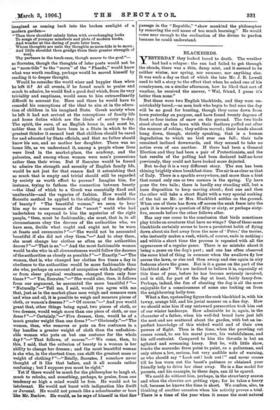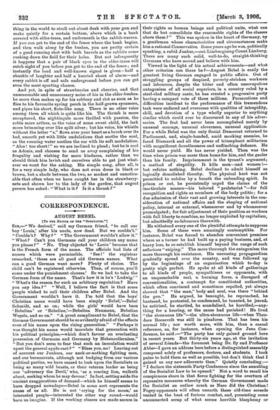BLACKBIRDS.
YESTERDAY they looked bored to death. The weather had had a relapse : the sun had failed to get through the clouds, there was a thin, damp mist, and it seemed to be neither winter, nor spring, nor summer, nor anything else. It was such a day as that of which the late Mr. J. R. Lowell used to tell a story to the effect that when he asked one of his countrymen, on a similar afternoon, how he liked that sort of weather, he received the answer, " Wal, friend, I guess it's better than none."
But these were two English blackbirds, and they were un- mistakably bored,—as men look who begin to feel sure the day will be no good for bunting, though they came down from town yesterday on purpose, and have found twenty degrees of frost or four inches of snow on the ground. The two birds stood about on the lawn with their feathers puffed out after the manner of robins ; they seldom moved ; their heads almost hung down, though, strictly speaking, that is a human degradation to which no bird ever can fall ; their tails remained inclined downwards, and they seemed to take no notice even of one another. If there had been a General Election and they had been a pair of Protectionists, and the last results of the polling had been declared half-an-hour previously, they could not have looked more dejected.
But to-day it is a very different story. The sun has been shining brightly since breakfast-time. The air is as clear as that of Italy. There is a sparkle everywhere, and more than a hint that round only one or two corners is the spring. Up have gone the two tails ; there is hardly any standing still, but a keen disposition to keep moving about ; first one and then the other will take a short flight with a very special cocking of the tail as Mr. or Mrs. Blackbird settles on the ground. , When one of them has flown off across the sunk fence into the park it is merely a question of fifty or sixty, or perhaps sixty- five, seconds before the other follows after.
Has any one come to the conclusion that birds sometimes play tricks on creatures that have no wings ? One of these same blackbirds certainly seems to have a persistent habit of flying down about six feet away from the nose of Peter,' the terrier, who instantly makes a rash, which, of course, ends in nothing ; and within a short time the process is repeated with all the appearance of a regular game. There is no mistake about it being a game on the dog's part ; and one has often observed the same kind of thing in summer when the swallows fly low across the lawn, or rise and then swoop and rise again in airy festoons above the grass. But is it a game on the part of the blackbird also ? We are inclined to believe it is, especially at this time of year, before he has become seriously involved, and is still, for part of the day at least, fairly fancy-free. Perhaps, indeed, the fun of cheating the dog is all the more enjoyable for a consciousness of some one looking on from the neighbouring holly-tree.
What a fine, upstanding figure the cock blackbird is, with his tawny, orange bill, and his jovial manner on a fine day. How we should miss him if any untoward persecution took him out of our winter landscape. How admirable he is, again, in the character of a father, when his well-fed brood have just left the nest and are scattered about the garden, with but an im- perfect knowledge of this wicked world and of their own powers of flight. Then is the time, when the prowling cat comes round, to see his moral power, his watchfulness, and his self-restraint. Compared to him the throstle is but an agitated and screaming hussy. But he, with little show, tracks the marauder from point to point, as a policeman, and only utters a low, serious, but very audible note of warning, as who should say "Look out! look out !" and never ceases till he has worn out the beast's patience or obtained your friendly help to drive her clear away. He is a fine model for parents, and his example, in these days, can ill be spared.
We could do without him, perhaps, in the strawberry season and when the cherries are getting ripe; for he takes a heavy toll, because he knows the time is short. We confess, also, to thinking of another occasion when his activity proves a trial. There is a time of the year when it seems the most natural thing in the world to stroll out about dusk with your gun and make quietly for a certain bottom, above which is a bank covered with elder-trees, and underneath is the rabbit-warren. If you can get to the end of the fence where the bank begins, and then walk along by the bushes, you are pretty certain of a good running shot with both barrels as the rabbits come rushing down the field for their holes. But not infrequently it happens that a pair of black eyes in the elder-trees will catch sight of you before you get to the end of the fence ; and instantly the loud and well-known signal is given—half a chuckle of laughter and half a hurried shout of alarm—and every rabbit is off and safe underground before you can get even the most sporting chance.
And yet, in spite of strawberries and cherries, and that unseasonable and unnecessary noise of his in the elder-bushes, he more than makes up for his robbery and riot as soon as he flies to his favourite spring perch in the half-grown sycamore, and pipes his short, flute-like song. There is no other voice among them all which is quite like his. The thrush is more enraptured, the nightingale more thrilled with passion, the robin more artless, as the voice of some sweet child, the lark more brimming over like spilt silver; but his voice, his whistle without the letter "s" flows over your heart as a brook over its bed, smooth yet with little undulations that soothe the soul, as the running water soothes the ear with its soft modulation. " Alas ! too short!" so we are inclined to plead ; but he is cool as Adonis, and chooses to send us away complaining of his frugality and wishing for more kindness, rather than we should think him lavish and ourselves able to get just what- ever we want for the asking. His simple song, after all, is for a very simple lady, who does not even dress in black or brown, but a shade between the two, so modest and unnotice- able that often when we have caught her in the strawberry- nets and shown her to the lady of the garden, that august person has asked : "What is it ? Is it a thrush ? "















































 Previous page
Previous page